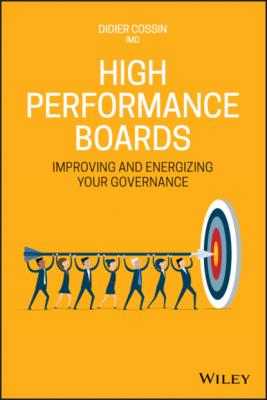High Performance Boards. Didier Cossin
Читать онлайн.| Название | High Performance Boards |
|---|---|
| Автор произведения | Didier Cossin |
| Жанр | Корпоративная культура |
| Серия | |
| Издательство | Корпоративная культура |
| Год выпуска | 0 |
| isbn | 9781119615699 |
Another definition of integrity is the ability to be clear about the boundaries of what is acceptable, and the commitment to stand by these regardless of the consequences. In other words, integrity is the way in which individuals support projects and then loyally commit to them. This is the case with artistic integrity, for example, when artists demonstrate loyalty to their vision and pursue their path, rather than conforming to what others think is right or acceptable or commercially valuable.
There is also a social dimension to integrity.1 Having integrity means not only standing up for what you believe and defending it, but also recognising that others have their own judgements and convictions. Bullying and coercion are therefore antithetical to integrity, whereas compromise and ambivalence might not be.
Table 3.1 summarises the key behaviours of successful directors.
Board members' specific legal responsibilities depend on the nature of the organisation and the jurisdiction within which the board operates. But clearly, successful directors need to have good judgement and the integrity to stand by what they believe. During crises, directors need to rise to the occasion, simplify the situation, and have the courage to do what is right.
We will return to the subject of board leadership and values in Chapter 17. But now we will look more closely at the first pillar of a board's effectiveness: people quality, focus, and dedication.
Table 3.1 Behaviours of Successful Directors – A Checklist
| Independence and IntegrityDo I say what I mean and mean what I say?Do I speak up when I fundamentally disagree with what someone has said – even if it may result in confrontation or ridicule?Am I clear about my role and legal responsibility as a director? Can I clearly and simply articulate my mandate and responsibility?How do I demonstrate accountability as a director?How do I feel about holding other directors accountable?Am I clear on what personal moral and ethical boundaries I will not cross, no matter what the consequences?Do I feel that I bring a fresh perspective to discussions – a different viewpoint or knowledge set – from the other directors? Equal Participation/Mutual RespectDo I contribute to the best of my ability in the boardroom?How curious am I about the company, what it does? How much time do I spend asking questions and seeking answers to these questions?Do I actively listen to others' contributions and respect their opinion, even if it is very different from mine?Can I understand the perspective of others – even if I don't agree with them? Openness and Constructive DissentAm I willing to express my viewpoint, even if I know it will be unpopular?Am I able to land sharp remarks in a positive and respectful way?Are there times when I hold back, due to a fear of how I may be perceived by the other directors?How do I ensure that I am not simply conforming with the group, but checking that my evaluation of issues is sound?How do I feel when others challenge my view?How actively do I challenge others' perspective and underlying assumptions? Critical Thinking and FramingHow do I ensure I am not falling prey to my own biases?Do I consistently reframe decisions presented in relative terms in absolute terms?Do I fear someone or something on this board? Conflicts of InterestHave I thoroughly considered my different business relationships and roles and how they influence one another (if at all)?How important is the income and status of this board seat? Does it affect my willingness to speak up? Knowledge AccelerationDo I seek external support when I feel that I need more knowledge in a certain area?How do I ensure that I continue to educate myself on topics that enable me to make an effective contribution, including professional service?Do I actively seek feedback from the Chair or other directors as to my knowledge and competence – and fill in necessary gaps?Do I have a firm grasp on the corporate governance code, pertinent regulations, and social expectation?Do I meet with key stakeholders?Do I regularly meet with other directors, beyond board meetings? |
Note
1 1 Calhoun, C. (1995). Standing for something. The Journal of Philosophy 92(5): 235–260. http://links.jstor.org/sici?sici=0022-362X%28199505%2992%3A5%3C235%3ASFS%3E2.0.CO%3B2-G
Конец ознакомительного фрагмента.
Текст предоставлен ООО «ЛитРес».
Прочитайте эту книгу целиком, купив полную легальную версию на ЛитРес.
Безопасно оплатить книгу можно банковской картой Visa, MasterCard, Maestro, со счета мобильного телефона, с платежного терминала, в салоне МТС или Связной, через PayPal, WebMoney, Яндекс.Деньги, QIWI Кошелек, бонусными картами или другим удобным Вам способом.
